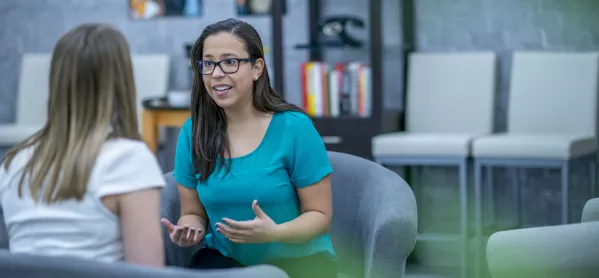Every secondary school student in Scotland is to be given access to professional counselling services in a national attempt to improve young people’s mental health.
They will be able to access a counsellor from September next year, after an announcement today confirming the longstanding ambition.
The Scottish government announced that an agreement had been reached with local authority umbrella body Cosla to allocate £60 million worth of funding for the programme over the next four years.
Background: ‘No clear delivery plan’ for school counsellors
Long read: ‘Mental health first aid’ treats stigma and pupils
Related: ‘Struggling’ teachers need more mental health support
Advice: Four ways to support student mental health struggles
In-depth: Why we need school-based counselling
It is designed to help build or expand counselling services for children and young people throughout the country.
School counsellors will help support young people’s emotional, behavioural and mental health, with pupils having access to services during school holidays.
Mental health minister Clare Haughey described the move as a “significant step”.
Mental health support in schools
“Children and young people can face many issues growing up and must have the right support available at the right time,” she said.
“Providing every secondary school with access to at least one counsellor by next year is a significant step forward in our package of measures to improve the mental health support available for children and young people.”
The Scottish government has said that counselling services currently delivered by qualified and registered counsellors through Pupil Equity Fund or Scottish Attainment Challenge money will continue.
It is hoped that the move will allow local authorities to reallocate such funds to other priorities, as part of efforts to close the “poverty-related attainment gap”.
A spokesman for the Scottish Children’s Services Coalition said: “This is very welcome news and is a vital step in improving the mental health of our children and young people through early intervention.
“School counsellors help support young people’s emotional, behavioural and mental health. Importantly, pupils will also have access to counsellors during school holidays, providing vital continuity of care.”
He added: “It has been estimated that the cost of five sessions of counselling is equivalent to just one contact with child and adolescent mental health services (Camhs).
“Therefore, investing a fraction of the mental health budget on school-based counselling services helps to keep the individual in school and avoid an unnecessary and often stigmatising mental health diagnosis, as well as reducing the burden on stretched and costly Camhs provision.“
In September, Tes Scotland reported that the Scottish government did not yet hold information on how many counsellors were working in schools and had not put a plan in place to monitor progress towards its national goal.
In a freedom of information (FOI) request, Tes Scotland asked the government questions about progress towards its target of 350 counsellors in schools by September 2020, but it had not yet established a baseline and was yet to decide how to track progress.
Nearly four in five parents want children to have access to counselling in schools, according to a poll published in January.
In the survey for the British Association for Counselling and Psychotherapy, 79 per cent of parents with children under 18 said they believed schools should offer counselling, and 72 per cent of all adults agreed.
Last year, a “huge” disparity in school-based counselling services around the country was laid bare by a Tes Scotland survey, prompting calls for urgent change.
While some councils were committed to providing specialist counselling in schools to help pupils with mental health and other difficulties, others provided few such services - if any - and some were sceptical about their value.




